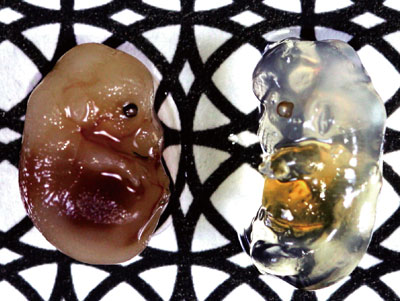Biology labs use a new chemical called Scale to turn specimens
transparent, so they can look into them. The result makes a mouse embryo
(pictured) look like a Gummi bear.
Discovered last year by researchers at Japan’s Riken
Brain Science Institute, Scale is made from compounds commonly found in
the biology lab, like urea and the detergent Triton X. Scale’s low cost
means it can be used much more widely than previously developed
sample-clearing agents, and it allows scientists to see deeper into
tissue than ever before. The discovery enabled the Riken team to produce
some of the most detailed maps of brain neurons ever published.
An article at DISCOVER magazine looks at the physics of light and
explains how transparent molecules are different from opaque molecules.
Which leaves me to wonder how scientists can see what they are looking
for if it
all turns transparent -and could making a specimen transparent change it so much that what you find is rendered meaningless?
More


No comments:
Post a Comment